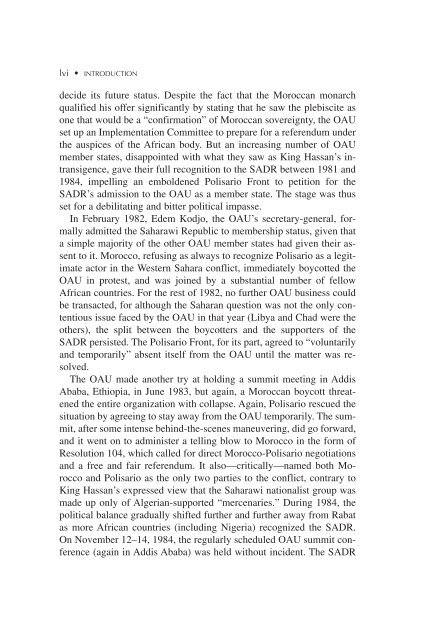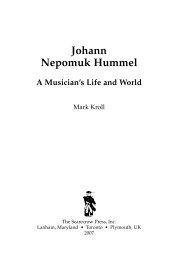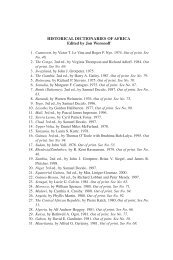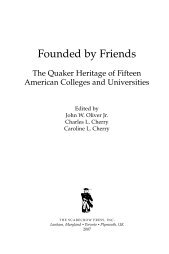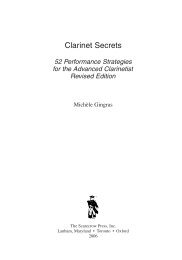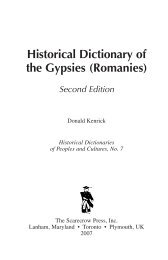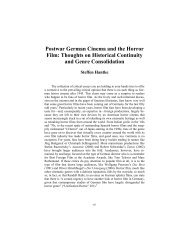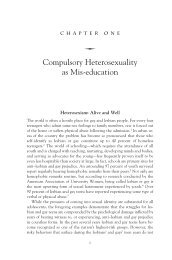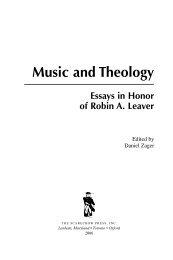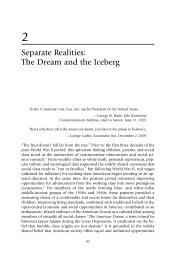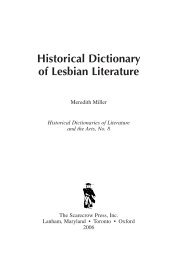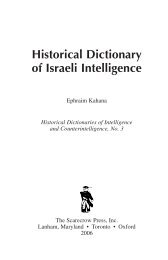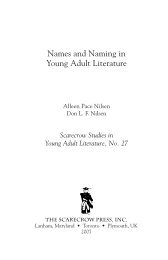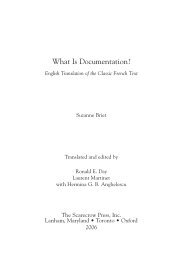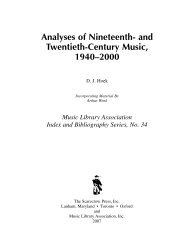Historical Dictionary of Western Sahara Third ... - Scarecrow Press
Historical Dictionary of Western Sahara Third ... - Scarecrow Press
Historical Dictionary of Western Sahara Third ... - Scarecrow Press
Create successful ePaper yourself
Turn your PDF publications into a flip-book with our unique Google optimized e-Paper software.
lvi • INTRODUCTION<br />
decide its future status. Despite the fact that the Moroccan monarch<br />
qualified his <strong>of</strong>fer significantly by stating that he saw the plebiscite as<br />
one that would be a “confirmation” <strong>of</strong> Moroccan sovereignty, the OAU<br />
set up an Implementation Committee to prepare for a referendum under<br />
the auspices <strong>of</strong> the African body. But an increasing number <strong>of</strong> OAU<br />
member states, disappointed with what they saw as King Hassan’s intransigence,<br />
gave their full recognition to the SADR between 1981 and<br />
1984, impelling an emboldened Polisario Front to petition for the<br />
SADR’s admission to the OAU as a member state. The stage was thus<br />
set for a debilitating and bitter political impasse.<br />
In February 1982, Edem Kodjo, the OAU’s secretary-general, formally<br />
admitted the <strong>Sahara</strong>wi Republic to membership status, given that<br />
a simple majority <strong>of</strong> the other OAU member states had given their assent<br />
to it. Morocco, refusing as always to recognize Polisario as a legitimate<br />
actor in the <strong>Western</strong> <strong>Sahara</strong> conflict, immediately boycotted the<br />
OAU in protest, and was joined by a substantial number <strong>of</strong> fellow<br />
African countries. For the rest <strong>of</strong> 1982, no further OAU business could<br />
be transacted, for although the <strong>Sahara</strong>n question was not the only contentious<br />
issue faced by the OAU in that year (Libya and Chad were the<br />
others), the split between the boycotters and the supporters <strong>of</strong> the<br />
SADR persisted. The Polisario Front, for its part, agreed to “voluntarily<br />
and temporarily” absent itself from the OAU until the matter was resolved.<br />
The OAU made another try at holding a summit meeting in Addis<br />
Ababa, Ethiopia, in June 1983, but again, a Moroccan boycott threatened<br />
the entire organization with collapse. Again, Polisario rescued the<br />
situation by agreeing to stay away from the OAU temporarily. The summit,<br />
after some intense behind-the-scenes maneuvering, did go forward,<br />
and it went on to administer a telling blow to Morocco in the form <strong>of</strong><br />
Resolution 104, which called for direct Morocco-Polisario negotiations<br />
and a free and fair referendum. It also—critically—named both Morocco<br />
and Polisario as the only two parties to the conflict, contrary to<br />
King Hassan’s expressed view that the <strong>Sahara</strong>wi nationalist group was<br />
made up only <strong>of</strong> Algerian-supported “mercenaries.” During 1984, the<br />
political balance gradually shifted further and further away from Rabat<br />
as more African countries (including Nigeria) recognized the SADR.<br />
On November 12–14, 1984, the regularly scheduled OAU summit conference<br />
(again in Addis Ababa) was held without incident. The SADR


